Exposure: The secret company from Herzliya that safeguards international trade
The founders of Ultra were in the cyber business until they understood that both in terms of business and value they would prefer to do something else with the technology that they developed. Now Ultra does OSINT of bills of lading: “Ultra is a strange creature, both a machine that prints money for governments and that saves consumers money. It saves time, labor and corruption”
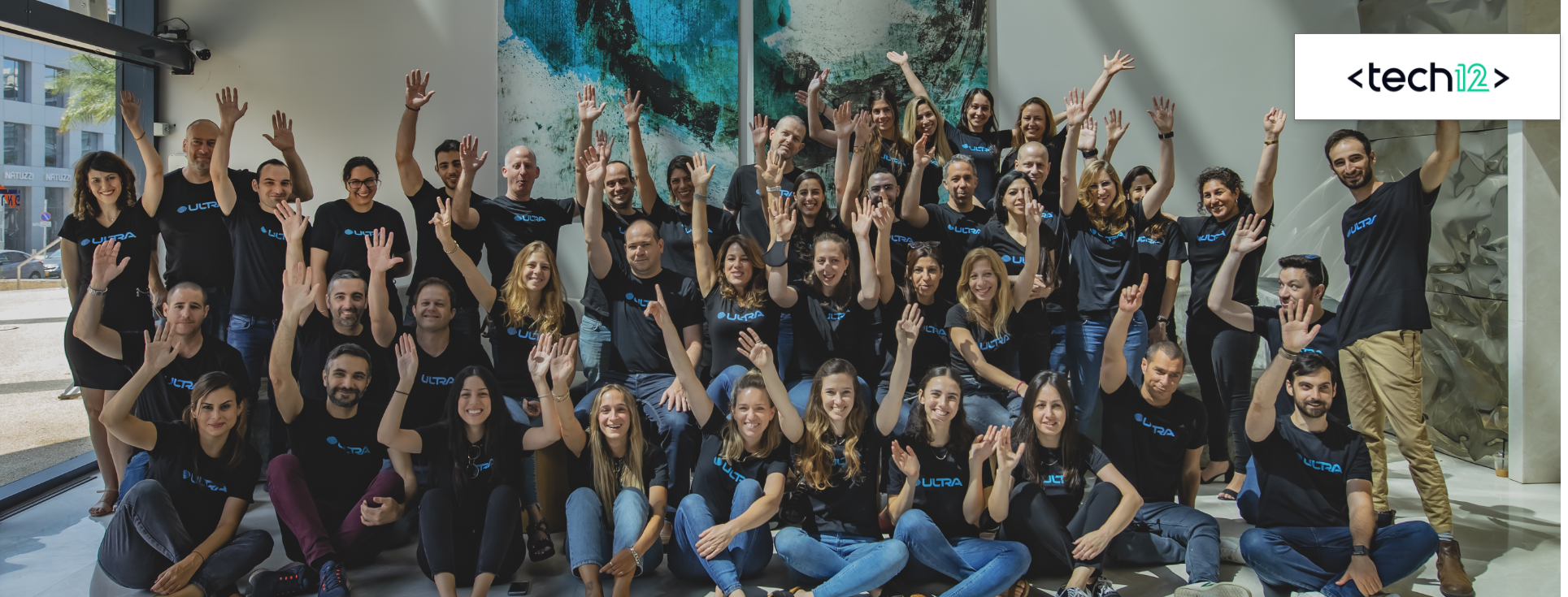
Ultra’s team. “We’re constantly being updated and learning new patterns of fraud” / Photography: Victor Levy, PR
Don’t bother Googling the name Ultra. This hi-tech company from Hamada Street in Herzliya has already been operating in relative secrecy for 7 years. The company’s first website went live only recently. However – it is one of the most intriguing local hi-tech companies with revenue of tens of millions of US dollars, profit, a crazy area of activity, and the value of Soonicorn (soon to be a unicorn, if you wish. In any event, it is a company whose value touches the lower end of a billion). The reason for secrecy? Mainly the nature of the entrepreneurs and the company’s previous occupation, as you will shortly understand. “Ultra was founded in February 2016 with five entrepreneurs, which is already a lot”, relates Ram Ben Tzion, one of Ultra’s entrepreneurs and its CEO, in his first media interview. “The company was established from the desire to develop capabilities in the OSINT (open-source intelligence) world, to take and use open information, and specifically: To link a person’s digital identity to their real identity. To take a telephone number or email address and define who it is. This is a product that wasn’t on the market then and is almost a commodity now”.
Ram Ben Tzion, CEO and founder: “We knew how to do everything with innovative automation capabilities and it was enough to go out into the world and rock the industry with many Israeli and international players. Today, without being judgmental, I’m happy that isn’t my business”
Ultra was launched and very quickly saw the fruits of its labor. “We targeted government organizations, law enforcement and security forces, airports – because all the company’s entrepreneurs came from that world”, says Ben Tzion, and refers to the security world. “It went well for us because our technology was much better and is the basis of everything we do now, which are different things”.
What can be said about the technology?
“This is technology that others didn’t know how to do, to bring an enormous amount of open information – not with sophistry and not with a wink – and process it interactively, like a human investigator, a journey of pulling strings. And then to edit the image produced, and give a recommendation. We knew how to do everything with innovative automation capabilities and it was enough to go out into the world and rock the industry with many Israeli and international players. Today, without being judgmental, I’m happy that isn’t my business”.
“We’re at the heart of the digital economy, which is relevant to everyone in the world”
Ultra has been profitable since its establishment, but as Ben Tzion hinted, the market rapidly became more and more competitive, and apparently in terms of value it was not exactly what the entrepreneurs from the security forces wanted to continue doing. And then a chance meeting takes place that would dramatically change the company’s path, as Ben Tzion recalls: “In June 2019, I found myself in London meeting a potential client, a Gulf state, with Yaron sitting in the same room. We spoke and he wanted to invest in us; we said – no thank you. At the time we were 25 people, we earned money and it was nice. But Yaron is a very determined person, and one that creates reality, does not exploit it. He saw what in retrospect turn out to be correct, that Ultra’s great potential is not in the intelligence world. Yaron is Yaron Ashkenazi, the founding partner of Awz, a Canadian-Israeli venture capital firm that specializes in dual-use technology, such that can have both security and civilian use, and in any event, Awz Ventures only invests in defense technologies.
Ben Tzion: “Ultra enables every shipment to be checked in slightly less than ten seconds and to tell whether to move to the green or red track. Do you know the percentage of containers that are currently checked? Slightly less than 2%. And the country collects taxes based on this. We can bring it to 100%”
Ashkenazi was in the Israeli Security Agency, the personal bodyguard of several prime ministers, and in 2016, he established Awz, which manages USD 250 million. He recommended that Ultra’s entrepreneurs target a completely different market. “The dilemma that arose at that stage was what we wanted to do with the company – remain a successful business or build a large company. It was clear that if “we go for it”, things would change: We didn’t know what a fund, a board or compliance was, many things were unclear – but we decided to go for it. We raised the first funds from Awz to take excellent technologies to other non-security markets, and decided to focus on trade”. When Ben Tzion says trade, the intention is not to sophisticated e-commerce sites, but the old-fashioned heavy world of international trade, logistics, containers, ports and cranes. “We’re at the heart of the digital economy, which is relevant to everyone in the world”, explains Ben Tzion, “Ultra is a strange creature, both a machine that prints money for governments and that saves consumers money. It saves time, labor and corruption”.
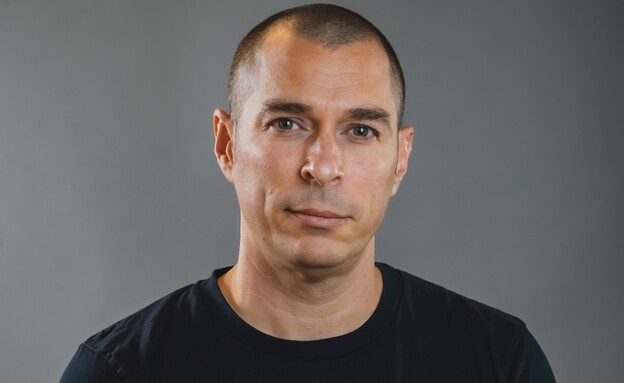
Ram Ben Tzion, one of Ultra’s entrepreneurs and its CEO: “This is technology that others didn’t know how to do” | Photography: Victor Levy, PR
Explain
“When a container arrives at any destination, it spends between 6 hours to 60 days with the tax authorities in highly advanced countries. The tax authorities must check whether the container matches the declaration, and release it. Before COVID-19, one day at the port was USD 250-300. Now it’s almost triple. Ultra enables every shipment to be checked in slightly less than ten seconds and to tell whether to move to the green or red track. Do you know the percentage of containers that are currently checked? Slightly less than 2%. And the country collects taxes based on this. We can bring it to 100%”. How does the magic happen? Ultra uses its OSINT capabilities on the “bill of lading” – the professional term for the delivery note. Ben Tzion: “The bill of lading contains the details of the shipment, the recipient, the ship and the merchandise. We can tell, for example, if the declared product isn’t manufactured in the country appearing on the form. Or that this manufacturer was convicted of a crime or caught manufacturing non-standard masks.”
Ben Tzion: “There are competitors, mainly giant European companies, that do physical inspections or X-rays of containers. But if the car inside is a total loss, that can’t be seen in an X-ray. And if the green tea sent from China to Mali contains residual pesticides, you won’t see it in an X-ray”
Ben Tzion says that Ultra does not define itself as a cyber company, but more as a “compliance” company, compliance and regulation, a company that prevents fraud – somewhat like Riskified, only in the world of international trade. “We enable quick clearance for the importer and protection against extortion. Have you tried to clear a container in the UK? I don’t advise it”, states Ben Tzion. “But when there’s a green pass, it’s much more difficult to blackmail you – it’s already been checked and approved”.
How much does it contribute to a country in terms of revenue?
“We collaborate with 35 customs authorities and until the end of this quarter, I hope 40 countries, and we increase the average collection by 5%-8%, which means an increase in tax revenue of between hundreds of millions to billions of US dollars. In practice, the growth rate is much more significant in developing countries. And again, the country makes big money, but the importer also gains time, quick clearance, which means money. The frauds and corrupt people are the losers. In such places, there is an entire ecosystem of decay – an industry with many mediators and hands, not all of which are needed. I was in Ghana last week and was told “we haven’t found a computer yet that can be bribed.’ We are making the process transparent in a way that’s changing world order”. Incidentally, Israel is not on Ultra’s list of customers even though it was offered the system for free, for reasons you can imagine, but perhaps that is for a different article. Regarding how the system looks on the customs officer’s side, Ben Tzion explains: “Our system is called Publican, the name of the first customs officer at the entrance to Ancient Rome, a Jew by the way. We scan hundreds of thousands of shipments daily. The interface is simple: A red, yellow or green indicator and a recommended action. Is there concern of a quality problem? Take a sample, a laboratory test. The price doesn’t seem to make sense. Provide a receipt. The manufacturer doesn’t seem right for the content – provide a catalog. The content is illogical in terms of dimensions – X-ray it.”
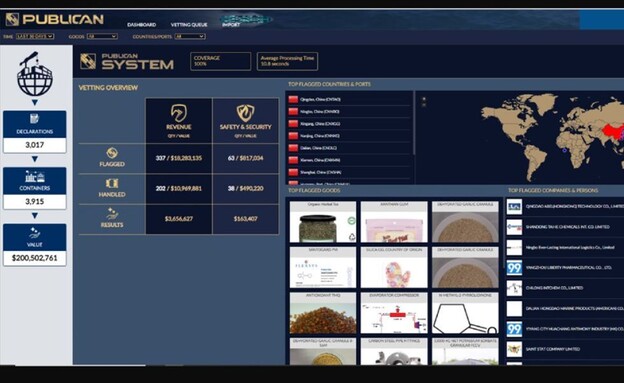
Ultra’s product. The interface is simple and provides a solution for any suspicion arising in the supply chain | Imaging: Ultra, PR
This leads me to the question, is the no competition? In any case, isn’t it impossible to X-ray a container?
“There are competitors, mainly giant European companies, that do physical inspections or X-rays of containers. But if the car inside is a total loss, that can’t be seen in an X-ray. And if the green tea sent from China to Mali contains residual pesticides, you won’t see it in an X-ray. The information allows seeing and identifying the norm and the extraordinary. But we must always be up-to-date and learn new patterns of fraud, which is done in ongoing discourse with the customers.”
From banana plantations to elite IDF units: The founders that look between the intentions
Ultra Group was founded by five. Ben Tzion (44) grew up on a kibbutz in the north and “worked in bananas”, according to him. He enlisted in the pilot’s course, but after a year “we understood that fine motor skills and I do not get along”, he says, and he dropped out of the course. From Hatzerim, he moved to the air force intelligence collection unit. “I stayed quite long, 8 years in permanent force.” After his release, Ben Tzion worked for a while as an external project manager for the Ministry of Defense in the field of air terrorism and simultaneously studied psychology. Like many people engaged in security at the time, for several years Ben Tzion also work at Logic and AGT, Mati Kochavi’s companies operating in different types of security industries. “I was in the Gulf when it was still a thing”, he recalls. Ben Tzion took up his position as CEO only in October. Beforehand, he was defined as Head of Strategy and Growth in the company, meaning to bring investors and transactions, and the CEO then was Sharon Shani, one of the founders. Shani served in naval intelligence for many years. With the position change, Shani left the company. “Sharon is a people-oriented manager, and this is very much embedded in the organization”, says Ben Tzion. The third founder is Elad Kotzer, who was a signal traffic analysis officer in the 8200 unit, has a doctorate in cognition and is the company COO. “He’s the responsible adult, our sanity check”, Ben Tzion says about him. The fourth founder is Ben Gold, “one of those who taught themselves to write software from the age of 8”, says Ben Tzion. He also served in the intelligence corps, holds a master’s in molecular biology and serves as the company CTO. The fifth founder is Irad Marley, an infantryman, who also has a history in Logic and led Ultra’s sales operations for many years, until his recent resignation.
Ben Tzion “thanks” coronavirus: “When the world suddenly shut down, at first the automatic response was to downsize, but we saw it as an opportunity to run ahead, develop, build the marketing infrastructure, sell a product that nobody had ever purchased”
That way, over the course of its life Ultra had to deal with the resignation of some founders, a change in business model and recently replacement of the CEO as well. Ben Tzion “thanks” coronavirus: “When the world suddenly shut down, at first the automatic response was to downsize, but we saw it as an opportunity to run ahead, develop, build the marketing infrastructure, sell a product that nobody had ever purchased”. Ultra is also facing the challenge of hiring people: “We are slightly more than 70 and are hiring across the board, mainly in development, analysts, data scientists, but are dealing with the challenge slightly differently”, explains Ben Tzion. “In my opinion, motivating people must be one-dimensional. Firstly, we check that the employee feels important in their job and does something unique in the world. Secondly, we want to ensure that every individual does something they haven’t done before and give them with them challenges that wouldn’t happen in other companies. Our programmer can be in Lomé (capital of Togo) and see what’s happening at the end of the string they’re writing. Thirdly, our staff are rewarded with a mix that represents a partnership in the work. Or in other words, they receive much, much, much more equity than is customary”.
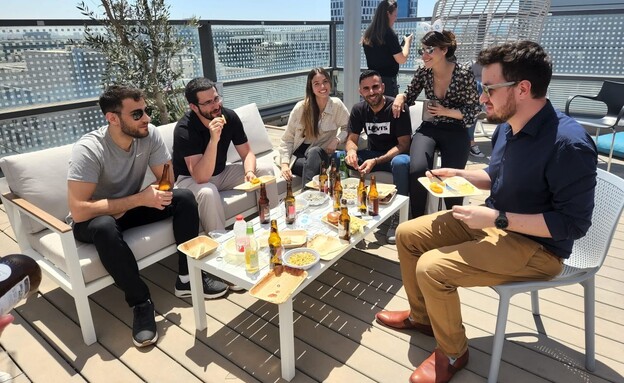
Ultra’s staff. Ben Tzion: “We check that the employee feels important in their work and does something unique in the world״ | Photography: Ultra, PR
Wait, if an employee in a profitable company gets equity, does that means Ultra’s employees receive dividends?
“Yes”.
The dollars are invested in a world view
Because of how Ultra has grown, only the founders, employees and Awz are on its cap table. To date, Awz has invested tens of millions of US dollars in Ultra, at first through the funds and then through an SPV that it set up for the purpose of a relatively large investment in Ultra. In contrast, Ben Tzion says that in future “there will be other partners”, and hints at a future major measure on the Company’s horizon – raising, issuance, sale – time will tell.
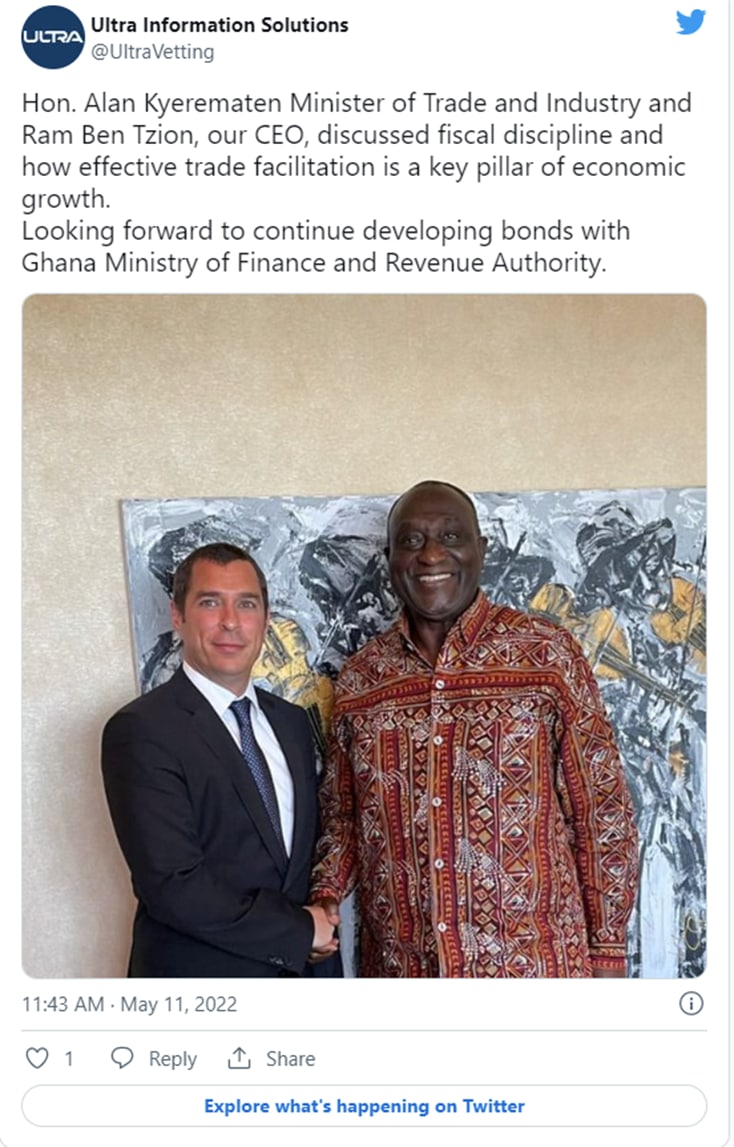
From CEO Ram Ben Tzion’s visit to Ghana “We haven’t found a computer yet that can be bribed”
Now Ultra is no longer a small company: “We’ve got tens of millions of dollars in revenue per year, are profitable, and with my plan, I know how to reach USD 100-120 million in ARR. But, I’m not a ‘unicorn’ yet. Ultra’s value does not represent 2021’s atmosphere – we didn’t swell and don’t have where to shrink. Once I met a venture capitalist who told me ‘if Ultra is a profitable company, then you, the CEO, are confused. Every dollar must be earmarked for aggressive growth, otherwise you’re not doing your job’. I’ve got a different world view.”
Ben Tzion: “We’re doing good business that allows you to sleep peacefully at night and wake up happy in the morning. I won’t make billboards and won’t hold parties either, but if my employee sits at Friday dinner and his father wants to know what his son from hi-tech is doing, here, this is what he does”
As noted, three months ago Ultra didn’t even have a website, a Twitter account, not to mention the press. Ben Tzion explains the decision to come out now: “In contradiction to the cyber industry that engages in hiding, we’ve made good choices in principle and are doing good business that allows you to sleep peacefully at night and wake up happy in the morning. So I won’t make billboards and won’t hold parties either, but if my employee sits at Friday dinner and his father wants to know what his son from hi-tech is doing, here, this is what he does”.
Get in touch
-
21 Soho Square London W1D 3QP, UK


